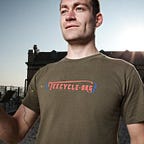Imagine there’s no advertising
It’s easy if you try
Imagine a world of social media with no advertising.
There are no ads popping up between friends in your Instagram feed. No sponsored posts on Facebook. No paid trending topics on Twitter.
In this alternative world, the founders of the big social networks talk about how important sharing and connecting is to the fabric of humanity — just like they do in this world.
But rather than monetizing Twitter and going public, for example, Jack Dorsey and Ev Williams decide to create a non-profit. The Arab Spring and the freeing of a journalist who used Twitter to alert others of his arrest inspired the founders to double down on the service as a public good.
Mark Zuckerberg talks about protecting your personal privacy. But he really means it. He has no profit motive to sell your data to Cambridge Analytica, because there are no ads on Facebook.
There’s also no algorithms controlling a newsfeed because there’s no incentive to try to keep you on the site longer with the most alluring content, and thus feed their advertising metrics. The services trusts you to make your own navigational decisions.
You may say that I’m a dreamer. But I’m not the only one.
This is a business model that’s actually working for the 5th most visited website in the world: Wikipedia.
I didn’t realize just how radical Jimmy Wales was until I heard his interview on How I Built This with Guy Raz.
From what I gathered, Wales was very much a Zuckerberg type figure. He loved math and messed around with coding in the early Internet days, even building his own browser. They both created huge, towering monolithic websites that have become cornerstones of the Internet.
But where Zuckerberg is worth some $64 billion — and dropping — Wales is worth a mere $1 million. Somewhere in building these companies and personal fortunes, their philosophies diverged.
Raz pointed out that there are multiple articles with headlines about how Wales is not a billionaire. Wales says he’s OK with that. He says that his life is interesting, and he’s building something that matters.
The way Wales tells it, making Wikipedia a non-profit was in part just a practical financial decision. Wales knew how to make money — he was a stock trader and made plenty of cash off of ads from an adult web portal.
But after the dot-com bust, advertising revenue dried up. A non-profit model seemed like a safer long-term bet. It was less lucrative, but also was able to harness volunteer contributions more effectively. The members not only contributed content, they also helped devise the community standards and solutions like developing anti-vandalism software. The people helped run and control the site.
Wales said the first he asked his community for money, Wikipedia was running on three servers and two of them crashed. The site slowed to a crawl. They needed help, so he turned to the community, long before crowdfunding was a household term. And it worked.
This utopian vision isn’t perfect. No model ever is. Right in Jimmy Wales’ Wikipedia bio there is a controversies section revolving around money and spending. And Wales doesn’t seem to be against advertising in general — he also has a for-profit hosting service supported by ads.
But at the same time, I have never heard of personal privacy and advertising scandals at Wikipedia like the ones we’re hearing at Facebook ( of which M.G. Siegler has a staggering list.)
Not having any advertising on Wikipedia has implications for how the site is run. Wales said that if they started putting banner images on their pages — which they’re allowed to do as a non-profit — they’d start paying attention to what pages drive the most traffic. The pages about Queen Victoria may not get much traffic compared to, say, Tesla. So maybe they put a Tesla link on their homepage or otherwise funnel traffic to pages with advertising potential.
(For the record, the fulvous whistling duck (Dendrocygna bicolor), a tropical and subtropical bird in the family of ducks, geese and swans, is the featured article today on Wikipedia’s main page.)
But advertising and profit aren’t what drives the agenda at Wikipedia. Instead, it is guided by five principles that includes that Wikipedia is free content that anyone can use, edit, and distribute.
According to Wikipedia (this seems like a time when citing Wikipedia seems appropriate), Wales wants information to be free:
Wales cites Austrian School economist Friedrich Hayek’s essay, “The Use of Knowledge in Society”, which he read as an undergraduate, as “central” to his thinking about “how to manage the Wikipedia project”. Hayek argued that information is decentralized — that each individual only knows a small fraction of what is known collectively — and that as a result, decisions are best made by those with local knowledge, rather than by a central authority.
I’m not sure if it’s too late to put the genie back in the bottle of online advertising, and in the process making you the product that is bought and sold. Wales is trying his same community-based model on news with the WikiTribune. Ev is also trying with Medium’s membership model, and the jury is still out.
But Wikipedia seems like a good case study that media without advertising is possible, and not just a naive utopian dream.
